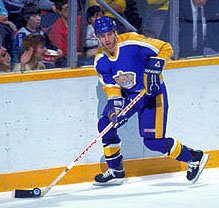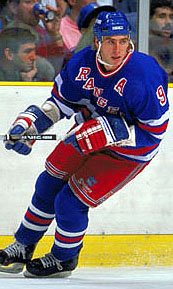 Rogie Vachon started his career in Montreal where he was on course to become one of yet another in a long list of great Habs netminders. His highest goals-against average with Montreal was a miniscule 2.87. He played a major role in upsetting the Bruins in the 1969 playoffs, as the Canadiens eliminated Bobby Or and the heavily favored Bruins in the semi-finals en route to the second of three Stanley Cup championships Vachon would enjoy while with Montreal.
Rogie Vachon started his career in Montreal where he was on course to become one of yet another in a long list of great Habs netminders. His highest goals-against average with Montreal was a miniscule 2.87. He played a major role in upsetting the Bruins in the 1969 playoffs, as the Canadiens eliminated Bobby Or and the heavily favored Bruins in the semi-finals en route to the second of three Stanley Cup championships Vachon would enjoy while with Montreal.Vachon looked like he was en route for hockey immortality - tending the nets for the legendary Canadiens, succeeding Gump Worsley and winning Stanley Cups. Then, late in the 1970-71 season, the Canadiens decided to give Rogie a bit of a rest right before the playoffs would start. They called up a promising young goalie to give him some apprentice time with established Vachon. The name of this prospect was Ken Dryden.
Dryden impressed the coaching staff so much that he played in all of the remaining 6 regular season games, only giving up 9 goals. However everyone expected Vachon to be between the pipes for the first playoff game. Much to everyone's surprise, head coach Al MacNeil decided to go with his hot hand, playing a hunch that the rookie wouldn't fold under pressure and at the same time give the Habs a huge advantage as no one had ever seen Dryden before. Dryden would lead the team to the Stanley Cup. Despite helping the Habs to previous championships, Vachon sat on the bench, and the next season was traded to Los Angeles.
Rogie became and still is a hero in Los Angeles, although his California zip code somewhat distanced him from the status of legend he probably should enjoy. He brought instant credibility to a struggling franchise with little fan support. His number 30 hangs high in the rafters along with names like Dave Taylor and Marcel Dionne. For 6 and 1/2 seasons he was the Kings workhorse, posting very respectable statistics and in hind-sight being one of the most valuable players to any one team. Playing in relative obscurity in the new, isolated hockey market, people often forgot about the great goalie named Rogie.
A classic stand up goalie, Vachon made the Kings respectable while becoming the most popular player in the Sunshine State. His best season came in 1974-75, finishing a close second to Bobby Clarke as the league's most valuable player. The Hockey News did name the big hearted competitor as player of the year.
 Cursed by the obscurity of playing with the Kings, the lasting Vachon legacy for many Canadians will forever be his play in the 1976 Canada Cup. With Bernie Parent and Ken Dryden not playing, Vachon backstopped the Canadian team to the inaugural championship. In the first 6 games he let in only 6 goals, and he was a standout in the best of three final against Czechoslovakia. Vachon was named as Canada's MVP, no small feat considering this team featured 16 eventual Hockey Hall of Famers.
Cursed by the obscurity of playing with the Kings, the lasting Vachon legacy for many Canadians will forever be his play in the 1976 Canada Cup. With Bernie Parent and Ken Dryden not playing, Vachon backstopped the Canadian team to the inaugural championship. In the first 6 games he let in only 6 goals, and he was a standout in the best of three final against Czechoslovakia. Vachon was named as Canada's MVP, no small feat considering this team featured 16 eventual Hockey Hall of Famers.While in Los Angeles Rogie almost became the first goalie to be credited with scoring a goal in the NHL. On Feb 15, 1977 the Kings were playing the NY Islanders. In the second period Vachon made a save and appeared to clear the puck to center ice. The Islanders regrouped and one of the Kings committed a penalty -- setting up a delayed-penalty situation. As the Islanders regrouped with possession of the puck (and the ref's arm raised) they pulled goalie Chico Resch, then sent the puck in deep Trottier picked up the puck by the side of the Kings' goal and attempted a pass to the defensemen at the point. The puck went between the two defensemen and all the way into the Islanders' empty net. After a moment of confusion, the goal was awarded to Rogie Vachon!
However, after the game the official scorers looked at the videotape and realized Kings' forward Vic Venasky cleared the puck after Vachon's earlier save that preceded the penalty -- so the goal was credited to Venasky.
Rogie Vachon would wind up his career with Detroit and then Boston, but is best known for his days with L.A. He would return to California and take over the General Manager role for many years.













